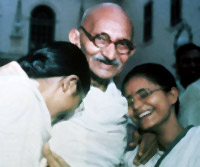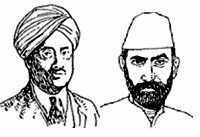 In the year 1919, the British Government passed a new rule called Rowlatt Act, under which the Government had the authority and power to arrest people and keep them in prisons without any trial if they are suspected with the charge of terrorism. The government also earned the power to refrain the newspapers from reporting and printing news. The Act was ill famed as `Black Act` by the people and Indians revolt in protest against the Rowlatt Act.
In the year 1919, the British Government passed a new rule called Rowlatt Act, under which the Government had the authority and power to arrest people and keep them in prisons without any trial if they are suspected with the charge of terrorism. The government also earned the power to refrain the newspapers from reporting and printing news. The Act was ill famed as `Black Act` by the people and Indians revolt in protest against the Rowlatt Act.
The positive aspect of reform by British Government was subjected to severe sabotage by the Rowlatt act of 1919.The act was named after the recommendations made in the previous year to the Imperial Legislative Council by the Rowlatt Commission. The Rowlatt Commission was appointed to investigate the `seditious conspiracy` of the Indian people. The Law passed empowered the Viceroy Government with extraordinary power to stop all violations by silencing the press, confining political activists without trial and arresting any individual suspected of sedition and treachery and arresting individuals without any warrant. A nationwide protest was raised by calling a Hartal (cessation of work).
Mahatma Gandhi was extremely agitated by enactment of Rowlatt Act. He was extremely critical about the act and argued that everyone cannot be punished for isolated political crime. The Act resulted in extensive outrage of political leaders as well as the common public and Government adapted more repressive measures to dominate the Native people. Gandhi and other leaders of national Congress found it futile to take the measure of constitutional opposition and thereby called a `hartal` where Indians suspended all the business and fasted to show their hatred for the British legislation.
However, the success of the Hartal in Delhi was dominated as the tension raise high and resulted in riot in Punjab and other provinces. Gandhi found that Indians were not ready yet for the protest in the path of `Ahimsa` (non-violence), which was integral part of Satyagraha and the Hartal was suspended.
 The agitation reached the pinnacle in Amritsar of Punjab. The Rowlatt act was effective from 10th March, 1919. In Punjab the protest movement was vast and strong. On 10th April, two renowned leaders of the Congress, Dr. Satya Pal and Dr. Saifuddin Kithlew were arrested and were taken to unknown place. A public meeting was held on 13th April at Jallianwala Bagh in a small park enclosed by buildings on all sides to protest against the arrest.
The agitation reached the pinnacle in Amritsar of Punjab. The Rowlatt act was effective from 10th March, 1919. In Punjab the protest movement was vast and strong. On 10th April, two renowned leaders of the Congress, Dr. Satya Pal and Dr. Saifuddin Kithlew were arrested and were taken to unknown place. A public meeting was held on 13th April at Jallianwala Bagh in a small park enclosed by buildings on all sides to protest against the arrest.
The meeting was absolutely peaceful and was also attended by women and children. Brigadier-General Reginald Dyer with his British troops entered the park, closed the entrance of the park and commanded his army to fire on the gathered people without any warning. The firing lasted for ten minutes and sixteen hundred rounds, killing about thousand people and more than two thousand people were left wounded and unattended. This massacre of Jaliwanwalabagh was the worst incidence of British rule and people lost their trust on British Government.



















